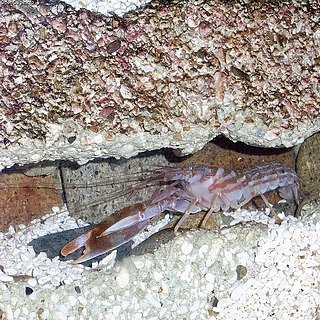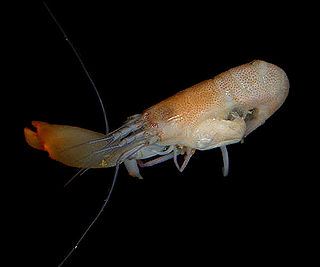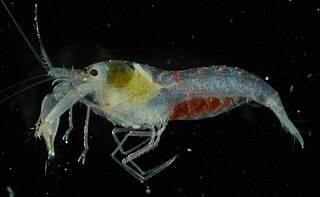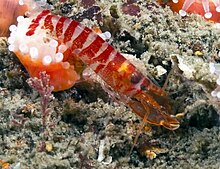
Alpheidae is a family of caridean snapping shrimp, characterized by having asymmetrical claws, the larger of which is typically capable of producing a loud snapping sound. Other common names for animals in the group are pistol shrimp or alpheid shrimp.

Athanas is a genus of shrimp of the family Alpheidae. These are small shrimp measuring 2 cm in length. Females have smaller chelae than males.

Automate is a genus of pistol shrimp of the family Alpheidae, containing the following species:
Bannereus is a genus of shrimp in the family Alpheidae.

Potamalpheops is a genus of shrimp in the family Alpheidae. It was originally erected by Powell in 1979 to house species from Africa. Later, Horton H. Hobbs, Jr. realised that the troglobitic shrimp he had described in 1973 from Oaxaca, Mexico as Alpheopsis stygicola, also belonged to the genus, and in 1991, A. J. Bruce described a new species from Australia, further expanding the genus' geographical range. It is now thought to represent a relict taxon from the Tethys Sea.

Salmoneus is a genus of shrimps of the family Alpheidae. Understanding of the genus has grown rapidly, with only 19 known species before 2000, to over 60 species as of 2023.

Synalpheus is a genus of snapping shrimp of the family Alpheidae, presently containing more than 160 species; new ones are described on a regular basis, and the exact number even of described species is disputed.

Leptalpheus is a genus of shrimp in the family Alpheidae, containing the following species:

Metabetaeus is a genus of shrimp in the family Alpheidae, comprising four species:
Parhippolyte sterreri is a species of marine decapod crustacean in the family Barbouriidae, formerly placed in the genus Somersiella. It is found in marine caves around the Bahamas, Cuba and Mexico and inland anchialine caves in Bermuda.

Alpheus randalli is a species of snapping shrimp in the family Alpheidae. It lives in the Marquesas Islands and parts of the Indian Ocean, including the Seychelles, in association with a goby of the genus Amblyeleotris. The shrimp is transparent or white with prominent red markings.

Lysmata is a genus of shrimp in the infraorder Caridea, the caridean shrimp. The genus belongs to the family Lysmatidae. Lysmata are popular ornamental shrimp in the marine aquarium trade for their bright color patterns, interesting behaviors, and ability to control certain aquarium pests such as sea anemones of the genus Aiptasia. They are known to command high prices on the pet market.

Athanas areteformis is a species of small alpheid shrimp from the Indo-West Pacific.
Alpheus tricolor is a crustacean belonging to the family of snapping shrimp. It was first isolated in Indonesia and Sri Lanka. It counts with a setose carapace, an acute rostrum, shallow adrostral furrows and a basicerite with a strong ventrolateral tooth. The lamella of its scaphocerite is not reduced, with an anterior margin that is concave. Its third maxilliped counts with an epipodial plate bearing thick setae, while its first chelipeds are found with their merus bearing a strong disto-mesial tooth; its third pereiopod has an armed ischium, with a simple and conical dactylus. Its telson is broad, distally tapering, with 2 pairs of dorsal spines. The species is named after its characteristic colour pattern, including white, red and orange.

Alpheus fasqueli is a crustacean belonging to the family of snapping shrimp. It was first isolated in Sri Lanka. It counts with a setose carapace, an acute and carinate rostrum, and unarmed orbital hoods. Its basicerite has a strong ventrolateral tooth. The lamella of its scaphocerite is not reduced. Its third maxilliped counts with an epipodial plate bearing thick setae, while its first chelipeds are found with their merus bearing a strong disto-mesial tooth; its third pereiopod has an armed ischium, with a simple and conical dactylus. Its telson is broad, distally tapering, with 2 pairs of dorsal spines. The species is named after Frédéric Fasquel, a photographer who contributed rare shrimp specimens for the Muséum national d'histoire naturelle.
François Louis Henri Coutière was a French zoologist, who specialized in the field of carcinology (crustaceans).

Synalpheus pinkfloydi, the Pink Floyd pistol shrimp, is a species of snapping shrimp in the genus Synalpheus. Described in 2017, it was named after the rock band Pink Floyd, in part because it has a distinctive "bright pink-red claw". The sound it makes by snapping the claw shut reaches 210 decibels, and can kill nearby small fish.
Athanas sydneyensis is a species of small alpheid shrimp.













